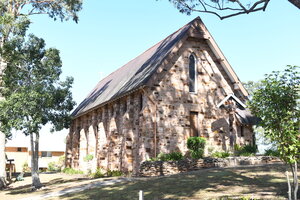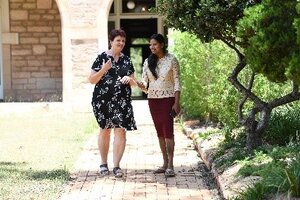Doing the ATP certificate means satisfactorily completing four SFC Short Courses, as well as the Anglican Experience workshop. Choose from the list below. Maybe your Conversation Partner has some ideas for you!
How long does each take?
Well, each SFC Short Course has 5 or 6 x 30 minute video episodes.
So, watch the video (~30 minutes), respond to some of the discussion questions using your journal (suggested time 30 minutes) and you’re looking at about 1 hour per session.
We suggest that you pace yourself. This allows you to reflect further as you go about your week. At this rate, you’ll finish the video content in 6 weeks, then you can add time for creating a Conversation Piece and it may take you up to 8 weeks.
You can of course move more quickly through the courses! It’s really up to you.
What are the SFC Short Courses?
St Francis College Short Courses are thematically-linked online videos with discussion/reflection questions for individuals and groups.
There are six SFC Short Courses – each has five or six episodes:
What Matters About Jesus
Exploring The Bible
Being Anglican
Understanding Anglican Worship
Faith Asking Questions (an ‘intro to simple theology’ course)
Faith Formation Essentials
Here’s a little more detail…
Was Jesus Real?
What did Jesus teach, and how?
Who were Jesus’ friends?
Why did Jesus die?
Did Jesus really rise from the dead?
Was Jesus who he said he was/is?
This short course has 6 episodes, averaging 24mins each.
In What Matters About Jesus people respond to key questions about Jesus, ideas that have puzzled and inspired millions of people throughout millennia.
Our guest speakers allow you into their own personal faith, each person is richly equipped through experience and study to give insights to the life, legacy and personal impact of the main character in the greatest story ever told. Was Jesus real? Did Jesus really rise from the dead? There are authentic and tested responses here, and room for your own story to intersect too.
A place to start
How to approach the Bible
Reading the Old Testament
Reading the New Testament
The Bible’s big themes
How the Bible still matters
This course has 6 episodes, each question within an episode has its own short video. The average time per episode is 25 minutes.
Consider this an overview of the themes, structure and purpose of the Bible. Real people discuss the Bible from all angles, throw tricky questions at it and emerge with passionate affection and respect for this ancient and modern book, for its impact on the world through the ages, and individual people today.
Questions include how to approach the Bible, and in what ways does the Bible still matter? Each episode begins with a personal story about the Bible and its place in a person’s faith journey.
Being Anglican
Tradition & Order?
A Scriptural Emphasis
Reason and Experience
The Middle Way
This introduction to the Anglican Community has 5 episodes (average length 7 minutes) covering the crucial elements of tradition, scripture and reason, the old ‘three-legged stool’ that keeps this modern Church balanced and growing. Where did this Anglican Church come from? It is so much more than a King Henry VIII wanting to ensure succession and his subsequent frustration with a Roman Catholic Pope.
It turns out there are local expressions of Christianity in England 1000 years before Henry! Archbishop Phillip Aspinall is engaging as he talks for this distinctive form of Christianity, and helps us understand why we need a Middle Way.
This Short Course includes 6 episodes, divided up into questions. Average time per ep is 25 mins.
Worship is an ancient and mystical thing. It is a central practice for Christians, and yet many of us don’t really understand what it is, and what we can bring to it and expect to get from it!
What is worship?
Loving a Prayer Book for Australia
The Eucharist Explained: the Liturgy of the Word
The Eucharist Explained: the Liturgy of the Sacrament
Other elements of the Liturgy
Participating in Liturgy
This is a useful course to help understand the way an Anglican Church service works, how it has two main parts, one focussed on the Bible and one on the Sacrament of Holy Communion. The Prayer Book has a rich history and comes to us from a great tradition of helping ordinary people participate together in prayer.
Did you know that the Anglican Prayer Book relies very heavily on Scripture to form its ‘liturgy’, the words we say together? Liturgical Assistants will love this course; it shows just how things work and the joy and importance of being a part of it all!
This course has 6 themes
Religion and why it makes a difference
The creator and being created
Who am I and what am I here for
Evil and what to do about it
Grace and learning to forgive and hope
Life, death and what comes next
Ever found yourself wondering how to make sense of the big and small things that happen in life? Often a change in thinking can put things into perspective. This course is a chance to learn about thinking through a God-lens… about how to think theologically about the world, what happens to us and those we love, and where we fit into it all. Mind blowing!
Introducing Faith Formation and Christian Education
Faith Formation and the Bible: why educate?
How do people learn?
Tools for understanding how faith grows
Engaging learners: your educational toolkit
Avoiding pitfalls: using language effectively & evaluating programs
If you love teaching, and could use some hints about teaching faith, then this is a Short Course for you. Interact with practical tools for engaging students about faith education, revisit theories about human development that form the foundations for modern education, and learn ideas about how we shape our faith as we grow. Its life-affirming and practical. Enjoy!





